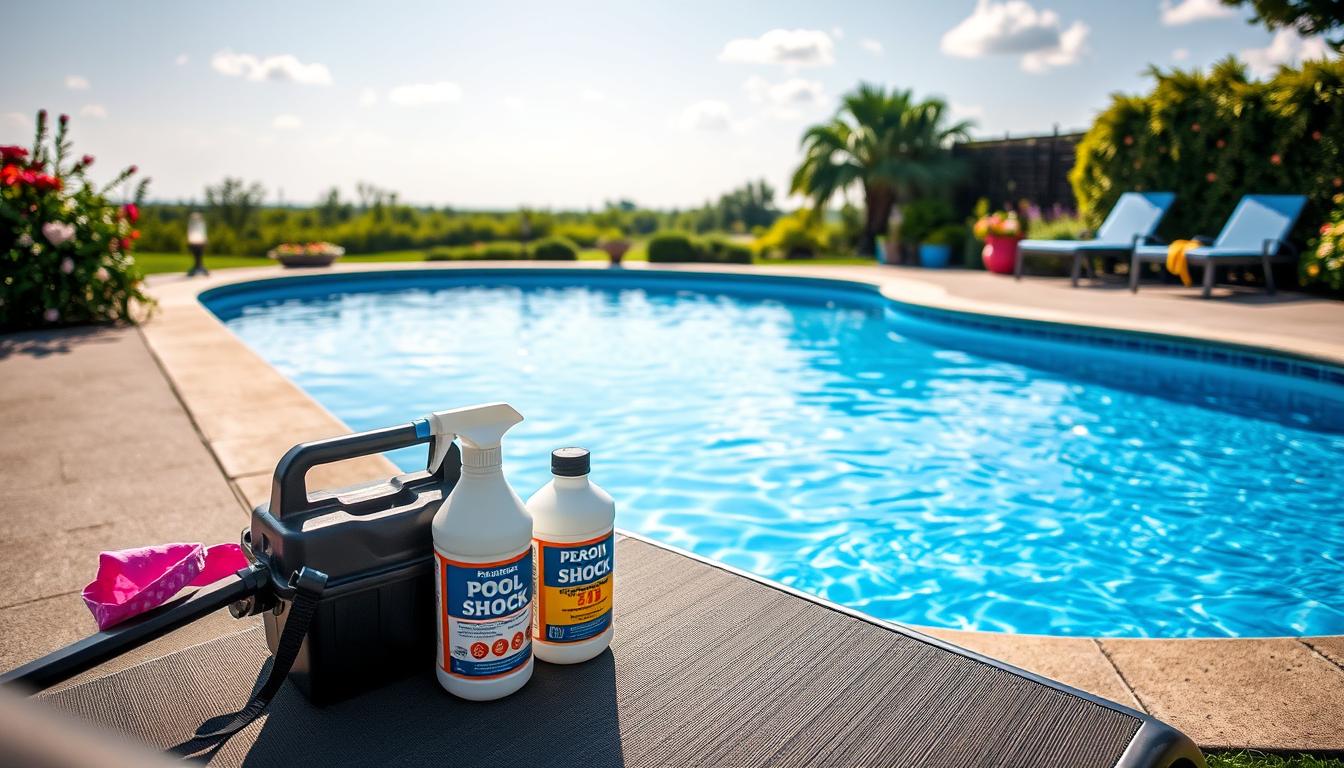
Shocking a pool is vital for eliminating bacteria and algae. Many pool owners are unsure about the clarification timeframe. Let’s explore the details of pool shock treatment duration.
We’ll provide a clear understanding of the shocking pool water timeline. This will help you maintain a clean and safe swimming environment.
Shocking your pool rapidly raises chlorine levels to combat contaminants. The clearing time can vary based on several factors. These include pool size, amount of shock used, and water quality issues.
Key Takeaways
- Shocking a pool is essential for maintaining a clean and safe swimming environment
- The pool shock treatment duration can vary depending on factors such as pool size and water quality
- On average, it takes 24-48 hours for a pool to clear up after shocking
- Running the pool pump continuously and maintaining proper circulation are crucial for effective shock treatment
- Regular testing and adjusting of chemical levels can help prevent the need for frequent shocking
Understanding Pool Shock Treatment
Pool shock treatment is vital for pool maintenance. It involves adding high doses of chlorine or non-chlorine shock to the water. This process eliminates contaminants, bacteria, and algae, ensuring a safe swimming environment.
The effectiveness of pool shock clearing varies. It depends on the type of shock used, pool size, and contamination severity.
What is Pool Shocking?
Pool shocking, or superchlorination, adds concentrated chlorine or non-chlorine shock to pool water. It quickly raises chlorine levels to break down and remove chloramines. Chloramines can cause eye and skin irritation, as well as unpleasant odors.
The shock clearing process restores water clarity and balance. It helps eliminate contaminants and maintain a healthy swimming environment.
| Type of Shock | Characteristics |
|---|---|
| Chlorine Shock | Contains typically a higher dose of chlorine (12% – 15%) |
| Non-Chlorine Oxy Shocks | Usually contains a minimum of 42% potassium peroxymonosulfate (MPS) |
| Lithium-Based Shocks | Double-duty with sanitizing and oxidizing capabilities |
Importance of Shocking Your Pool
Regular pool shocking keeps your swimming environment clean and safe. Over time, pool chlorine shock dissipation rates increase. Factors like sunlight, high temperatures, and heavy usage contribute to this.
This can lead to contaminant buildup and decreased sanitizing effectiveness. Shocking restores proper chlorine levels, keeping water clear and free of harmful bacteria.
Shocking prevents common pool problems like cloudy water and algae growth. Follow a regular shocking schedule and monitor chlorine levels. This keeps your pool in top shape for refreshing swims anytime.
How Long Does Shock Take to Clear Pool?
Pool shocking is vital for safe swimming. The clearing time varies, but typically you should wait 24 hours before swimming. Several factors affect how quickly your pool clears after shocking.
Factors Affecting Shock Clearing Time
Pool water clarification after shocking depends on various elements. These include pool size, algae growth, filtration system efficiency, and water chemistry levels.
- Pool size and volume
- Severity of algae growth or contamination
- Efficiency of the filtration system
- Calcium and pH levels
- Presence of cyanuric acid
- Water circulation and filtration adequacy
Average Time for Pool to Clear After Shocking
Most pools clear within 24 to 48 hours after shocking. In some cases, it may take up to a week for full clarity. A good rule is to wait one hour per pound of shock added.
Maintain chlorine levels between 1.0 and 4.0 parts per million for safe swimming. Test chlorine levels before swimming early to ensure they’re under 4 ppm.
Signs Your Pool is Clear After Shocking
Look for these signs to know if your pool is ready for swimming:
- Crystal clear water with visible pool bottom
- Balanced chemical levels (pH between 7.2-7.8, alkalinity, calcium hardness, and chlorine)
- Absence of cloudy or murky appearance in the water
Shocking eliminates bacteria by increasing chlorine levels. Follow safety precautions and wait the recommended time to avoid health risks. These risks include skin irritation, eye irritation, and clothing discoloration.
| Waiting Time | Precautions |
|---|---|
| At least 24 hours | Ideal waiting time for safe swimming |
| 1 hour per pound of shock | General rule for clearing time |
| Up to 48 hours or more | For severe algae growth or contamination |
Conclusion
Shocking your pool is crucial for maintaining a clean and safe swimming environment. The clearing time after shocking varies based on pool size, algae growth, and filtration efficiency. Usually, pools clear within 24 to 48 hours, but it may take up to a week.
Understanding pool shocking and its influencing factors is key to determining clearing time. Regular water testing, chemical adjustments, and proper filtration optimize shocking effectiveness. These steps can reduce the time needed for your pool to clear.
Watch for signs that your pool is clear after shocking. Look for improved water clarity, balanced chemicals, and no algae. A consistent maintenance routine ensures a sparkling pool throughout the swimming season.
Regular shocking, brushing, and vacuuming keep your pool inviting. These steps create a refreshing oasis for you and your family to enjoy all season long.







